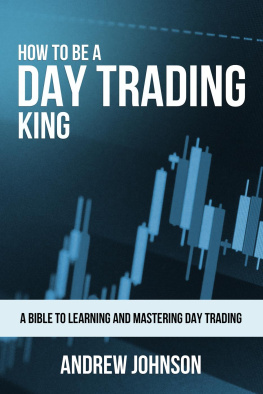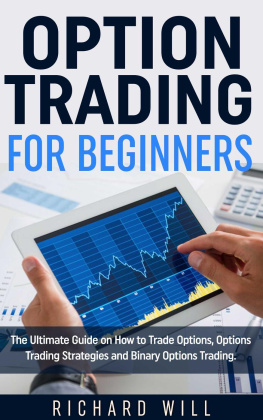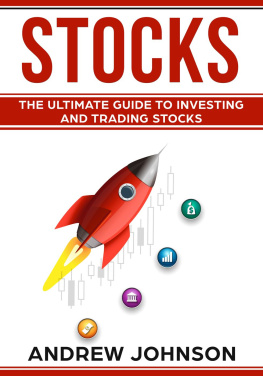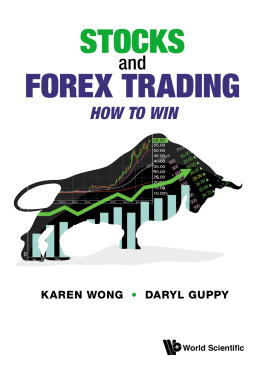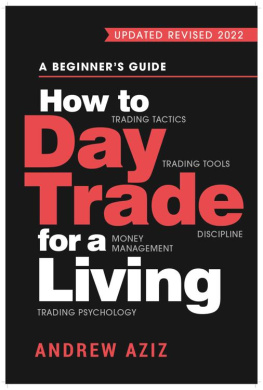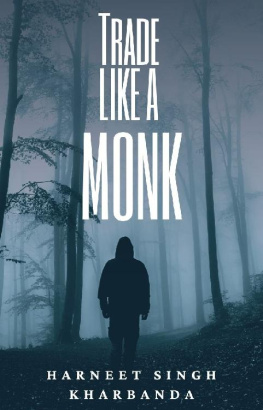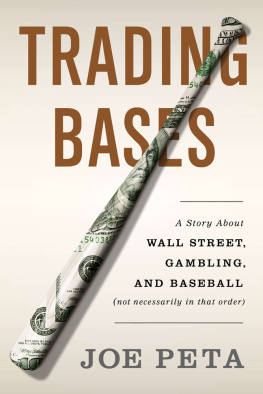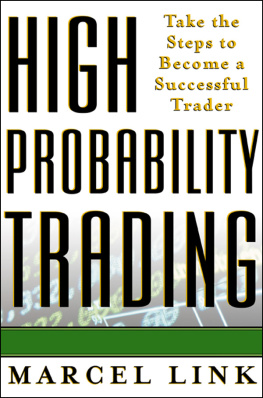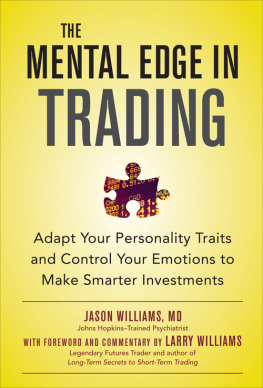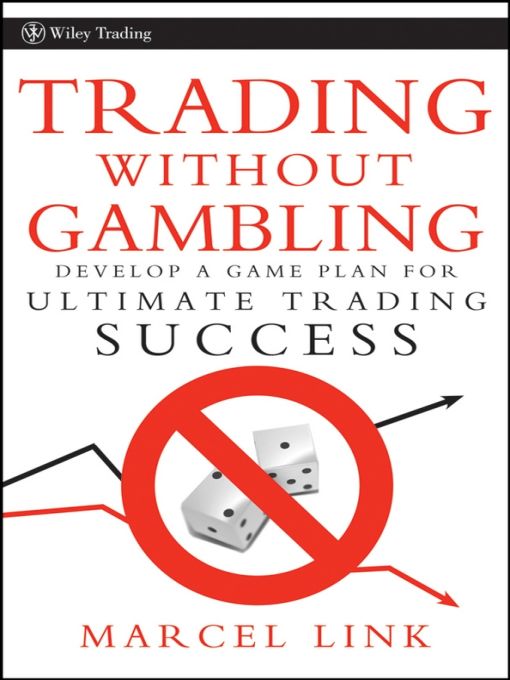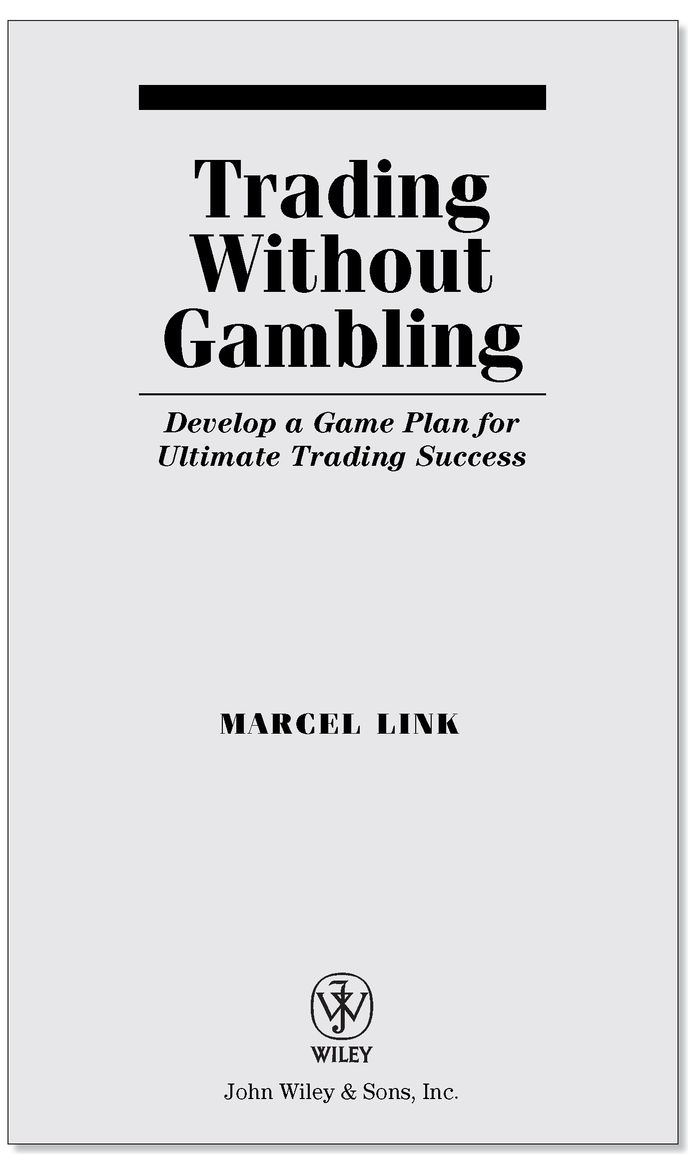Table of Contents
Dedicated to all the people who bought my first book,
giving me the opportunity to write another, and,
to all the people I ignored and didnt have time for
while I wrote this book.
Acknowledgments
Id like to thank the following people:
Stephen Isaacs of then McGraw-Hill for giving me a shot with my first book;
Dr. Alexander Elder, for assisting me in getting an agent for this book; Ted Bonanno, that agent who helped me land a deal for this book with John Wiley & Sons;
Kevin Commins, Laura Walsh, and Emilie Herman of John Wiley & Sons for working with me on this book, for giving me free rein, and for putting up with my requests for extensions;
Those unfortunate copyeditors at Wiley who had to fix my grammar; And last, my family for letting me ignore them while I finished up the book.
Introduction
So here I am again, writing another book. After the incredible runaway success of my debut smash book High Probability Trading, there was interest in another, so here I am. If you havent read my first book you should instantly go out and buy a few copies of it now.
Anyway, High Probability Trading realistically took a trader through the steps of becoming a better trader showing him how to succeed and how to avoid pitfalls. It covered many aspects of trading including entering and exiting trades, money management, making and back testing systems and fighting many of the personal demons traders have.
NO GAMBLE TRADING
If you took everything from the first book, put it into a funnel and strained out the fluff, the key things would all boil down to one basic concept and that is the importance of making a trading and game plan to trade with, and following it, of course. This new book will take that concept and expand on it as I believe it to be the key to successful trading.
Many people look at trading as a gamble, and yes there is risk involved, but a well-prepared trader, with a solid game plan and discipline can learn to trade without gambling, the same way the professional gamblers do.
Though Ill show examples of my trading and talk about technical analysis, this book is not about how to pick market bottoms or giving you great trading systems, instead it will focus on how you can become a better trader. They key to winning in the markets is planning for it and knowing in advance how to react to certain situations, and this is what a game plan will do for you. Trading is not simply about buying and selling, but about the knowing when, and why to do so.
WHY THIS BOOK
I have found over the years that there are many ways to make and lose money in the market. For those who read my first book youll know I have a very down to earth way of looking at the markets and my writing style is how I talk. I never say Im trading the Standard and Poors 500 futures, I say the S&Ps and thats how you will see it in this book. I try to write as if Im talking to you as a friendly mentor, not some arrogant know-it-all lecturer. Im not trying to make you believe I have the holy grail of trading or that Im the best trader out there. Ive been trading 20 years now and Ive had my share of mistakes, but I learned from my mistakes, and believe me there were many. It is this learning process that Ill try to pass on to you. I got a call today from a trader in Hawaii, saying that he learned more from reading my first book than from his two years in grad school. I actually have gotten many e-mails and calls over the last few years thanking me for helping people become better traders. Its little things like that that make writing a book worthwhile, because as my first editor said to me, most people do not write books for the money.
Throughout the book Ill give examples of trades and positions I put on the day Im writing. Lately, Ive been mostly trading the Dow Jones electronic futures and the S&P E-mini, which I just refer to as the S&Ps most of the time, some crude and a few select stocks. So Ill probably be giving examples using those. You wont find charts from five years ago that show the perfect textbook head-and-shoulders pattern that an author researched for weeks trying to find to make a point. Instead, Ill give you patterns from the day I was writing. I tend to talk about my many mistakes over the years, and youll gain a lot of knowledge if you learn from them like I have. Making mistakes and learning from them is the most powerful tool you could have. You learn a lot more from mistakes than from good trades, as you likely take good trades for granted and never realized why they are good. Many of the positive reviews I got about High Probability Trading said something like, I wish I had read this book when I first starting trading, I would have saved a lot of money. Mr. Link seems to have been looking over my shoulder as he wrote this book. I can clearly see so many things I have done wrong.
In setting out to write this book I realized I do not need to write a 700-page tome on trading. There really is not that much to say about creating a trading and game plan. What I will give you though is a concise, straight to the point idea on how to trade better by having these plans. I will do my best to not throw in a useless overflow of information. Though I do add a bit of humor and some interesting facts here and there that hopefully doesnt offend anyone. The goal of the book is to apply every subject to just one thing and thats how it relates to your trading plans. Whether Im talking about stops, discipline, risk, entering a trade or anything else, it will relate to the trading and game plan.
Though I do talk about both trading and game plans, this book will be more about using a game plan than about making a basic trading plan. Youll understand what Im talking about after the first few chapters.
I could detail what a game plan is here but my first couple of chapters wont be nearly as riveting if I do. What I can tell you are the basic benefits of a game plan:
It will force you to select a trading style.
It will encourage you to study the markets.
It will help you pick the best trades.
It will prepare you for what the market has to offer.
It will help you monitor and exit trades.
It will keep you from overtrading.
It will keep you financially in line.
It will keep you focused.
It will take the gamble out of your trading.
And it will make you a better trader.
A LITTLE BIT ABOUT ME
When I started out I always thought trading was easy and fun. I was a little lackadaisical in preparing for the markets and was undisciplined. Yes, trading was easy, making money, however, wasnt as easy. I did so many things a trader should not do, that not surprisingly I lost a good amount of money trading. Even when I started I was really good at technical analyses and picking markets levels, however, I suffered in areas like discipline, overtrading, and not being prepared. What would happen is Id do great for a while and then blow out. Granted, I was definitely undercapitalized at the beginning, but I still could have done okay if I had been disciplined. Having had the luxury of being in constant contact for 15 years with both successful, professional traders and those who didnt have a prayer, Ive been able to see one key difference they possess. Winning traders worked hard at being knowledgeable and had a definite plan and trading strategy they consistently followed, and most of all they were disciplined about adhering to their plans. Once I was able to adopt those things, I was able to turn it around and become successful.


